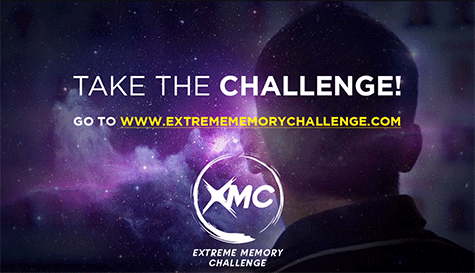Two dozen of the world’s best memory athletes will battle head-to-head for their share of $75,000 prize money as the Extreme Memory Tournament (XMT-2016) returns to the headquarters of San Diego-based Dart NeuroScience June 24-26.
Sponsored by Washington University in St. Louis and Dart NeuroScience, the live-streamed competition offers the internet public a chance to observe some of the word’s most amazing memory champs in action.
Now in its third year, the competition features an international array to the world’s top memory athletes, including men and women ages 13-48 from Sweden, Germany, Mongolia, the Netherlands, United Kingdom, Philippines, as well as four Americans.
Free and open to the public, the tournament can be viewed in person or watched online via streaming broadcast. This year’s matchup includes eight competitors from the 2015 tournament, along with 16 more who qualified in a series of advance online competitions.
The competitors have developed their minds to astonishing levels, allowing them to memorize:
- A deck of shuffled cards in 23 seconds.
- The names of 30 random people in 60 seconds.
- An 80-digit number in only 21 seconds.
- 48 random words in 59 seconds.
- The order of 30 random images (sunset, cow, bridge, etc.) in 14 seconds.
While three contestants from Germany have dominated past tournaments, a full-time medical student from the University of Mississippi and relative newcomer to memory competitions could be a strong challenger for this year’s XMT championship.
The medical student, Alex Mullen, began exploring memorization techniques after struggling to keep up with coursework. He now teaches others to use mnemomic strategies to help in their own learning,
“Alex has been training for only a few years, yet he quickly rocketed to the top of the ranks,” said memory researcher and tournament adviser Henry L. “Roddy” Roediger, the James S. McDonnell Distinguished University Professor in Arts & Sciences at Washington University. “He’s definitely a contestant to watch in this year’s championship.”
Mullen finished fourth in the 2015 XMT tournament. He later became the first American to win the World Memory Championship (held in China in December 2015). He also won the USA Memory Championship (held in Hershey, Pennsylvania in May 2016).
In addition to the tournament’s five main memorization events (Cards, Names, Numbers, Words and Images), competitors who reach the semifinals will be required to attempt a surprise task of memorization.
Previous surprise challenges include memorizing ten license plates (complete with state) in 60 seconds, then recalling them out loud on stage in front of the spectators; committing to memory a chess board covered with a variety of coins; and memorizing a series of 20 textures while blindfolded.

Washington University, a leader in human memory research, became involved with the championship because of the opportunity it provides to learn more about the cognitive processes and techniques that contribute to their phenomenal memorization and recall skills.
Roediger is principal investigator on the grant from Dart NeuroScience to support research on people with exceptional memory. Co-investigators include Dave Balota, professor of psychological and brain sciences in Arts & Sciences and neurology at Washington University School of Medicine in St. Louis; and Kathleen B. McDermott, professor of psychological and brain sciences in Arts & Sciences and in the department of radiology at the Medical School.
Other Washington University faculty and students making the trip to San Diego include research assistants Jeff Berg and Nicole Smith and postdoctoral researcher John Nestojko, all in the department of psychological and brain sciences.
Although the extreme memory research is in its early stages, preliminary findings suggest that the key cognitive skill underlying extreme memory abilities may be the ability to focus one’s attention during the memorization process.
Mary Pyc, a researcher at Dart, worked on the project as a postdoctoral research associate in psychology in Arts & Sciences. Now working as a cognitive scientist in target discovery at Dart NeuroScience, she is a lead coordinator for the XMT event.
“It’s surprising how exciting it is to watch, either live or online,” Pyc said. “Seeing people memorize a deck of cards so quickly, then watching as they recall them, knowing if they’ve made a mistake (via the competition’s software) is fascinating, and even inspiring to think that maybe we can learn to do what they do.”